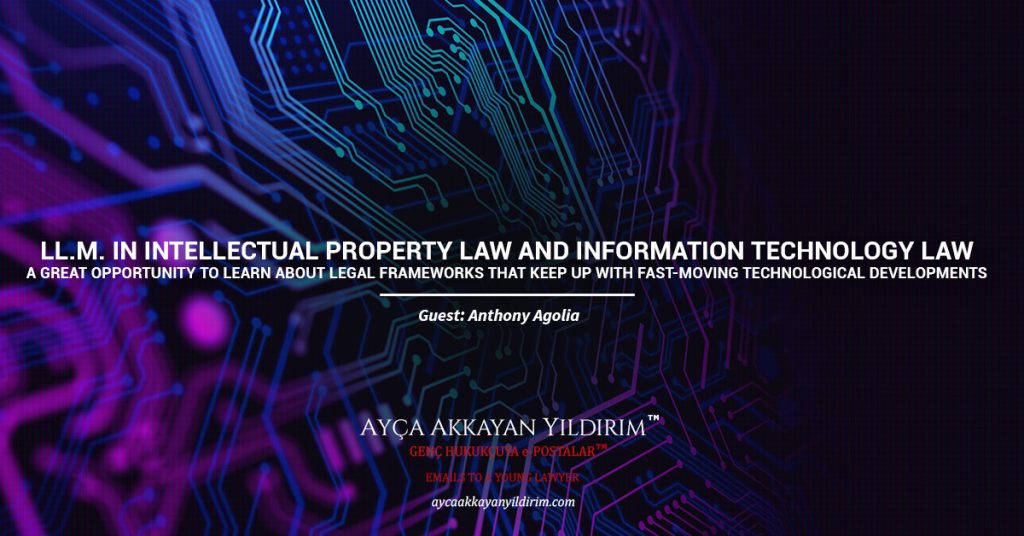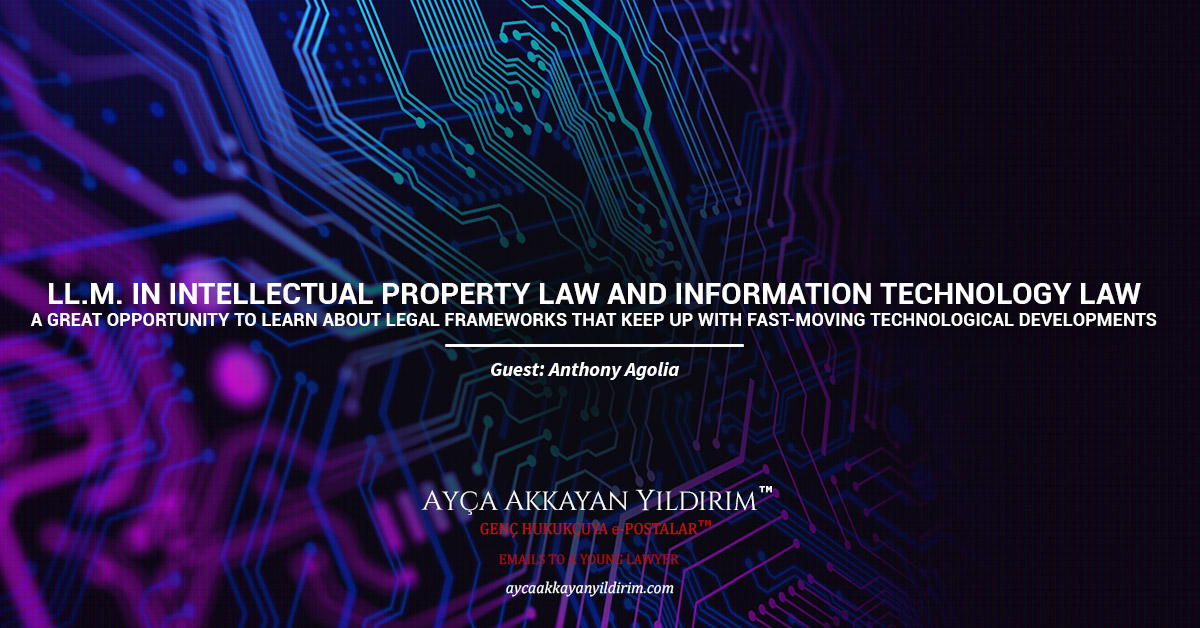Tuesday, March 29, 2022


Date : March 29, 2022
To : Young Lawyers
Re : LL.M. IN INTELLECTUAL PROPERTY LAW AND INFORMATION TECHNOLOGY LAW: A GREAT OPPORTUNITY TO LEARN ABOUT LEGAL FRAMEWORKS THAT KEEP UP WITH FAST-MOVING TECHNOLOGICAL DEVELOPMENTS
INTERNATIONAL LL.M. PROGRAMS: FORDHAM UNIVERSITY SCHOOL of LAW, NEW YORK, NY, USA
I sincerely thank Anthony Agolia, Director of International and Non-J.D. Programs, for taking the time
to answer my questions. GHK
GHK: Director Agolia, although we used to see LL.M. programs in IP Law and in IT Law separately, Fordham’s LL.M. in Intellectual Property Law and Information Technology Law comes to the forefront in combining these specialized topics. What is the idea behind designing this program?
AA: Technology has fundamentally changed the world in which today’s law students will launch their careers, and the legal profession has changed along with it. To be ready, lawyers need to solve challenges and problems with new tools and apply established law in innovative ways. They may even find themselves practicing in areas that didn’t exist when they first arrived on campus. Legal frameworks are constantly racing to keep up with fast-moving technological developments. We see this as an opportunity to fill a great need in the legal services marketplace.
GHK: Fordham Law’s IP Law Program is ranked 19th by the 2022 U.S. News & World Report. What do you think are the most critical factors behind this success?
AA: Unpacking the rankings is always a challenge, but the lion’s share of the credit belongs to our esteemed faculty who specialize in this area: Courtney Cox, Janet Freilich, Hugh Hansen, Ron Lazebnik, Mark R. Patterson, Susan Scafidi, Sepehr Shahshahani, and Olivier Sylvain, who collectively offer an incredible variety of IPIT courses every academic year. We also have a wide range of student organizations with a focus in this area: Artists, Representation Society, Fordham Intellectual Property, Media and Entertainment Law Journal, Fordham Sports Law Forum, and the Media and Entertainment Law Society.
GHK: Is LL.M. in Intellectual Property Law and Information Technology Law designed for a particular type of students in mind? Do the students in the Intellectual Property Law and Information Technology Law LL.M. program come from diverse backgrounds, including law and science?
AA: Foreign-trained applicants are eligible to apply to the LLM program if they hold a degree from a recognized foreign law school, law faculty, or law department that is substantially equivalent to the legal education provided by an ABA-approved law school in the United States. Academic performance and professional experience are both important considerations in the admissions process, although some students are admitted without prior work experience. The vast majority of students in the program come with little science background, although some do.
GHK: Could you please explain the weight or emphasis given to each part of a student’s application, such as GPA, language score, a letter of motivation, and letters of recommendation? How should an applicant from Turkey address a low GPA or lack of work experience in an IP and IT law application to Fordham Law?
AA: The admissions committee carefully reviews each part of an applicant’s file. There is not one factor that is determinative. Mediocre grades, for example, can be overcome by relevant work experience or an internship, a strong letter of recommendation, or other factors. It is also important to keep in mind that the committee assesses each applicant based on where they are in their studies or career. An applicant who is about to graduate from law school, for example, would not be expected to have very much relevant work experience. In this case, letters of recommendation, grades, and other factors will weigh more heavily. If you believe something in your application might not be clear to the committee, such as a personal hardship during a semester that caused lower than normal grades or a gap in your employment and education history, you may add an addendum to your application file that will give context for the committee to consider. Finally, double check each part of your application. Your personal statement and resume should be free of errors and look professional.
GHK: IP Institute’s annual Fordham Intellectual Property Law and Policy Conference, known as the “Davos of IP,” draws hundreds of IP practitioners, judges, academics, and policymakers from around the world every year. Could you share your insights and observations on how this conference can help the LL.M. students?
AA: The Fordham Intellectual Property Law and Policy Conference fosters progress toward identifying and resolving issues of concern to the IP community and permits policy-makers to formulate integrated approaches to such concerns. The contributions, by leading world experts, analyze the most pressing issues in copyright, trademark and patent law as seen from the perspectives of the USA, the EU, Asia and WIPO. The conference always makes a valuable and lasting contribution to the discourse in IP law, as well as trade and competition law. It is a great opportunity for students to learn about cutting-edge topics and network with like-minded professionals.
GHK: Can a student pursuing LL.M. in Intellectual Property Law and Information Technology Law take courses in bar-tested subjects? Also, how often do you see international students interested in taking the patent bar exam offered by the USPTO?
AA: Yes, foreign-trained students in the IPIT program can gain eligibility to sit for the New York bar exam by taking courses that are required by Rule 520.6 of the New York Court of Appeals. Most IP practitioners do not sit for the patent bar because lawyers typically do not have the necessary science background, but through the years, we have seen our fair share of students follow this path.
GHK: Fordham Law is one of a group of select schools invited to participate in January job fairs exclusive for international LL.M. students. Could you inform us about the special recruitment programs that Fordham LL.M. students can participate in?
AA: Fordham Law is one of a select number of U.S. law schools that take part in the International Student Interview Program (ISIP), a major job fair for LL.M. students that takes place each year in New York City. Foreign-trained LL.M. students. Our Graduate Professional Development program (GPDP) helps LL.M. students navigate their careers by offering individualized guidance in defining their professional goals and moving toward them. Services include assistance with building a U.S.-style resume and cover letter, networking techniques, and interview preparation. GPDP also provides a range of online resources to help students with their job searches. GPDP also hosts a series of conversations with LL.M. alumni who share their insights on practice, networking, and making the most of your LL.M. and time in New York City. Highlights from our LL.M. Alumni Professionalism Series are available here. See also our LL.M. Alumni Spotlights here.
GHK: Thank you for your time, Director Agolia. Any parting thoughts for applicants from Turkey considering Fordham Law?
AA: Thank you for exploring our LL.M. program. Additional information on our programs is available on our website. We hope to have the opportunity to welcome you to our community of engaged—and engaging—legal professionals. I look forward to joining you throughout this journey!
